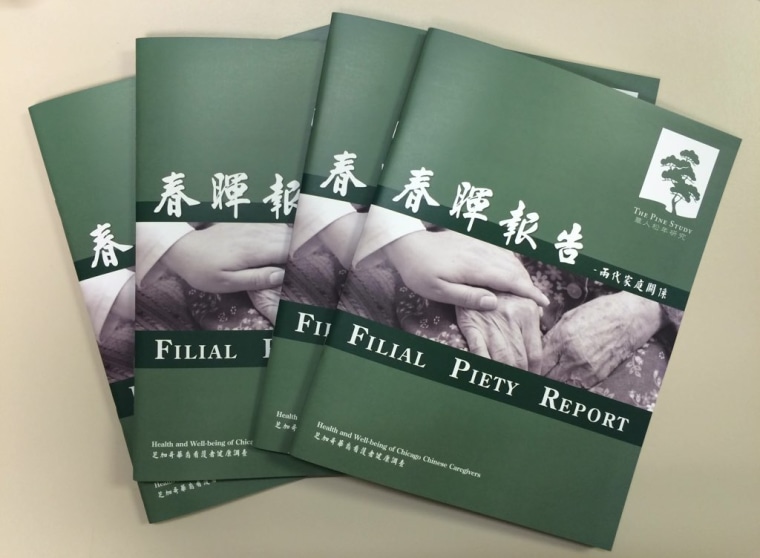One in two Chinese-American adults experience symptoms of depression and anxiety as a result of caring for elderly parents, according to the results of a new report on filial piety.
The report, released in December by health and aging experts from Rush University Medical Center and Northwestern University Feinberg School of Medicine, examines the caregiving burdens and psychological well-being of Chinese adults within the United States — a subject with only “rudimentary understanding” due to scarce data.
“Filial piety is a Confucius virtue that prescribes adult children are obligated to provide adequate care for their parents, both emotionally and instrumentally,” Dr. XinQi Dong, the study’s lead author, told NBC News. Dong is also the director of the Chinese Health, Aging, and Policy Program at Rush University Medical Center.
The report aims to extend understanding of Chinese American family well-being, and is the sequel to The PINE Study, the first population-based study of U.S. Chinese older adults.
“We invited adult children aged 21 and older of the PINE participants to participate in the piety study,” said Dr. Melissa A. Simon, vice chair of clinical research at Northwestern University’s Feinberg School of Medicine’s Department of Obstetrics and Gynecology and the study’s co-principal investigator. “From 2012 to 2014, we conducted interviews with 548 adult children.”
“[Caregivers] are not supported enough. How could you talk to your physician and healthcare providers about the struggles you go through if you don’t have enough trust?”
While family-oriented values remain important within U.S. Chinese families, researchers say, Chinese adults may experience significant health problems as a result of caregiving stress — about 40 percent of the study’s participants rated their health as fair or poor.
“Our age range of the participants is from 22 to 76, and about 70 percent of caregivers are older than the age of 40, so many of them have chronic diseases…and have to deal with the struggles of their own health and wellbeing,” Dong said.
Further research indicates potential caregiver mistreatment may be the root cause of Chinese-American caregivers’ physical and emotional instability. More than half of adult children screened positive for potential caregiver mistreatment, with one third of participants claiming physical mistreatment by their parents prior to turning 18 years old.
One-third of the study's participants also report living with their parents, but Dong notes caregivers feel a closer connection to their father than mother because adult children perceive their mothers to be more critical of their actions.
“76 percent of participants felt their father really understands them and care about them as opposed to only 18 percent of the mothers," Dong said. “We can certainly imagine a scenario where adult children may be going to their mother to open up more and, therefore, being criticized more. Perhaps the frequencies of encounters with their father may be less.”
According to The PINE Study, the Chinese-American elderly population has increased four times quicker than the general U.S. older adult population, and Dong estimates that over the next 20 years, one out of four older adults will be a Chinese person. "That’s tremendous,” he said.
With the aging population in mind, understanding and addressing the burdens of adult children caregivers becomes of increasing importance.
“What is also important to note here is that Chinese, around the world, account for the population that has the highest suicide rates,” Simon said. “Yet, Chinese, especially in the U.S., are a significantly understudied population.”
Which is why, she adds, data is so important to move the field forward to help support such a vulnerable, yet growing, population.
But one of the main difficulties in resolving the issue lies in the distrust of the healthcare system by Chinese Americans, according to the study’s researchers. The difficulty of the task is further elevated in combination with immigration, lack of ability to communicate in English, and low income that the population faces.
“[Caregivers] are not supported enough,” Dong said. “How could you talk to your physician and healthcare providers about the struggles you go through if you don’t have enough trust?”
